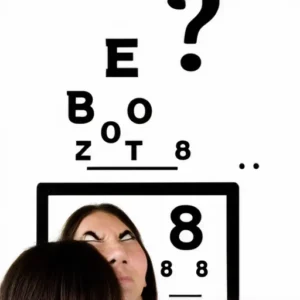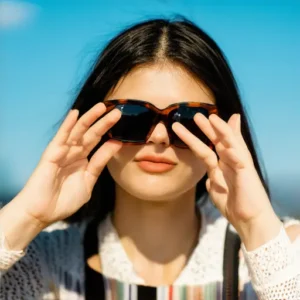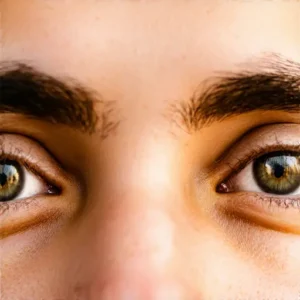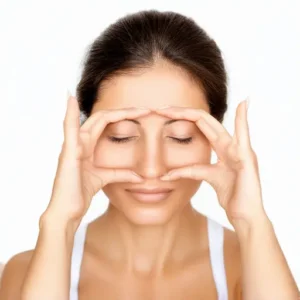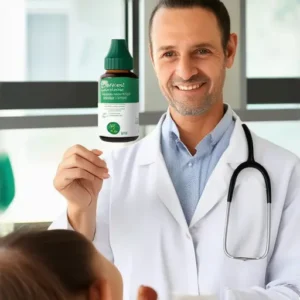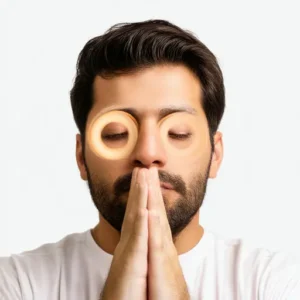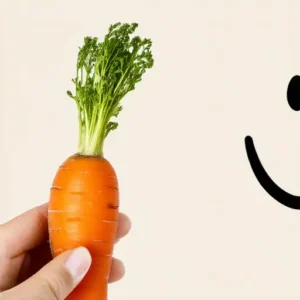Short Sightedness Improve With Age: Myth or Reality?
Does Short-Sightedness Really Improve With Age? The Eye-Opening Truth
Ever noticed your vision changing as you get older and wondered – could my short-sightedness actually be improving? You’re not alone. Many of my patients ask me this question, especially when they start needing reading glasses but suddenly find their distance vision seems clearer. Let’s clear up the confusion.
As an optometrist with over a decade of experience, I’ve seen firsthand how aging affects vision. While some lucky folks do experience changes that make them think their myopia is getting better, the reality is more nuanced than that. Grab your favorite beverage (and maybe your glasses), and let’s dive in.
Myopia 101: Why Distant Objects Look Blurry
Imagine your eye is like a camera that can’t quite focus properly on faraway subjects. That’s essentially what happens with short-sightedness (or myopia, if we’re being fancy). Either your eyeball grew a bit too long or your cornea got a tad too curved during childhood, causing light to land just short of your retina. The result? Blurry street signs but crystal-clear phone screens.
The Big Myth: “My Eyes Will Fix Themselves After 40”
Let’s bust some common myths I hear in my clinic every week:
- “Turning 40 magically fixes nearsightedness.” Nope – that’s your presbyopia kicking in (more on that later).
- “Wearing glasses makes your eyes lazy.” That’s like saying using crutches makes your legs weaker!
- “Eye yoga can cure myopia.” If only it were that simple – I’d be out of a job!
The Science Behind Aging Eyes
Here’s what actually happens to your vision as you get older:
Your Eye’s Natural Lens Gets Stiff
Remember how flexible you were as a kid? Your eye lens was too. Around age 40, that lens starts hardening like day-old bread, making it tougher to focus up close (hello, reading glasses!). This is presbyopia – and it affects everyone eventually.
The Presbyopia-Myopia Balancing Act
Here’s where things get interesting. If you’re slightly nearsighted (-1.00 to -2.00), taking off your distance glasses might suddenly help you read the menu. This “second sight” phenomenon tricks many into thinking their myopia improved, when really it’s just two vision problems temporarily canceling each other out.
A patient of mine, Sarah, came in thrilled she could suddenly read without glasses at 45. After testing, we discovered her distance prescription hadn’t changed – her new presbyopia just compensated for her mild myopia when reading. She left with bifocals instead of good news about “improved” vision.
When Might Myopia Actually Improve?
While true improvement is rare, these scenarios can cause temporary changes:
- Cataracts: They can shift your prescription, sometimes making you temporarily less nearsighted (but blurrier overall)
- Pregnancy/hormonal changes: Some women notice vision fluctuations (usually temporary)
- Diabetes: Blood sugar changes can alter your prescription (a good reason for regular eye exams!)
Smart Strategies for Aging Eyes
Instead of hoping for magical improvement, try these eye-healthy habits:
The 20-20-20 Rule (Your Eyes Will Thank You)
Every 20 minutes, look 20 feet away for 20 seconds. It’s like a mini-vacation for your eye muscles after staring at screens all day.
Nutrition Matters
Load up on leafy greens (for lutein), fatty fish (omega-3s), and colorful veggies (antioxidants). Your retinas will feast on these nutrients.
Surgical Options
From LASIK to lens implants, modern procedures can correct myopia beautifully – though they won’t stop presbyopia from arriving right on schedule around 40.
The Bottom Line
While your myopia prescription might stabilize in your 20s-30s, don’t count on aging to reverse it. What feels like improvement is usually just your eyes’ natural changes playing tricks on you.
Pro Tip: Get a comprehensive eye exam yearly after 40. We can spot real changes versus temporary fluctuations and keep your vision crisp at all distances.
Have you experienced the “my vision got better after 40” phenomenon? I’d love to hear your story in the comments – and I’m happy to answer any questions about your changing vision!
Dr. Emily Sanders, OD
Optometrist & Myopia Specialist
Sharpen Vision at Any Age: Here’s How
Your Eyes Deserve Love—Here’s How to Keep Them Sharp
Think about it—your eyes are working overtime from the moment you wake up until you close them at night. Whether you’re squinting at screens, battling glare, or just noticing things aren’t as crisp as they used to be, here’s the good news: it’s never too late to boost your vision. Let’s talk real-world strategies to protect those precious peepers, from fighting digital fatigue to keeping your sight crystal clear as the years go by.
Why Your Eye Health Matters (No Matter Your Age)
Ever tried reading a menu in dim lighting or missed a step because your eyes played tricks on you? Our vision touches everything—how we learn, work, and move through the world. But here’s the kicker: most of us don’t give our eyes a second thought until something goes wrong. The secret? A little TLC goes a long way. We’re talking smart nutrition, simple exercises, and yes—those checkups you keep rescheduling.
Modern Life’s Biggest Eye Challenges
Our grandparents didn’t have to deal with this stuff:
- Screen zombie syndrome: That 2pm blurry vision after hours of Zoom calls? Classic digital strain.
- The over-40 reality check: Suddenly needing reading glasses to see your phone? Hello, presbyopia.
- Lighting fails: Harsh office fluorescents or that cozy-but-too-dim bedside lamp? Both are eye offenders.
- Diet shortcuts: Skipping the greens means missing vision-protecting nutrients.
What Makes This Guide Different
Forget generic advice—we’re serving up science-backed, real-life strategies that actually work. Ready to see things differently (literally)? Let’s go.
Vision 101: How Your Eyes Work & How to Help Them
Knowing how your eyes function is like having the instruction manual for your body’s most sophisticated camera.
The Eye’s Magic Trick: Turning Light Into Sight
Here’s the cool part: light zips through your cornea, gets focused by your lens, and hits the retina like a movie projector screen. When any part of this system gets wonky—maybe your lens stiffens with age or your retina takes damage—that’s when things get fuzzy.
What’s Messing With Your Vision?
- Father Time: After 40, your eye’s lens becomes about as flexible as stale bread (hence the reading glasses).
- Family traits: If everyone in your family tree wears thick glasses, genetics might be calling the shots.
- Daily grind: Sun, smog, and non-stop scrolling all take their toll.
- Health ripple effects: Conditions like diabetes can show up in your eyes before anywhere else.
Eye Myths Busted
Old wives’ tale: “Eat a bushel of carrots for eagle eyes.”
Truth: While carrots help, they’re just one piece of the vision puzzle.
Mom was wrong about: “You’ll ruin your eyes reading under blankets with a flashlight!”
Actually: It’ll tire your eyes, but won’t cause permanent damage.
Eat This, Not That: Vision Edition
Your grocery list just became your eye’s best friend.
Superfoods for Super Sight
- Greens that mean business: Spinach and kale pack lutein—nature’s sunglasses for your retinas.
- Fish fat = eye fuel: Salmon’s omega-3s could be the antidote to your dry eye struggles.
- Rainbow produce: Carrots (orange), bell peppers (red), and blueberries (blue) each bring unique vision perks.
- Breakfast MVP: Egg yolks contain zinc—your night vision’s secret weapon.
The Vision Vitamin Cheat Sheet
Want to upgrade your eye game? Load up on:
- Vitamin A: Night driving got scary? Sweet potatoes to the rescue.
- Vitamin C: Not just for colds—it’s like armor for your eye’s blood vessels.
- Vitamin E: Almonds and sunflower seeds fight cellular aging in your eyes.
- Zinc: Oysters aren’t just fancy—they help produce protective eye pigment.
Don’t Forget to Drink… For Your Eyes
Dehydrated? So are your eyes. That gritty feeling? Try chugging water before reaching for eye drops. Pro tip: cucumber slices on your eyes aren’t just for spas—they hydrate from the outside in!
Small Changes, Big Vision Payoff
These effortless habits are like a daily multivitamin for your eyes.
The 20-20-20 Rule (Your Eyes’ Best Friend)
Every 20 minutes, look 20 feet away for 20 seconds. It’s like a coffee break for your eye muscles—simple but revolutionary.
Lighting & Screens: Set Up for Success
- Ditch the cave vibe—soft, even lighting reduces strain.
- Your monitor should sit at arm’s length, with the top at or just below eye level.
- That late-night Instagram scroll? At least turn on night mode.
Sweat for Your Sight
That jog around the neighborhood? It’s delivering oxygen-rich blood to your eyes. Yoga’s downward dog might even help lower eye pressure—talk about a multitasking workout!
Gym for Your Eyes (No Dumbbells Required)
Your eye muscles need exercise too—here’s how to train them.
Focus Like a Camera Lens
- The pencil trick: Hold a pen at arm’s length, focus, then shift to something across the room. Repeat until your eyes feel the burn (the good kind).
- Lazy eights: Trace imaginary figure eights with your eyes to combat that stiff, screen-strained feeling.
The Ultimate Eye Spa Treatment
Rub your hands together until warm, then gently cup them over closed eyes (no pressure!). Breathe deep for a minute—instant eye refresh, zero cost.
Peripheral Vision Workout
Try noticing objects at the edges of your vision without turning your head. It’s like widening your visual “peripheral awareness”—handy for sports and driving.
Why That Eye Exam Is Non-Negotiable
“But my vision seems fine!” Famous last words…
What Eye Docs Spot That You Can’t
Annual exams catch sneaky issues like:
- Subtle prescription changes (no, squinting isn’t a solution).
- Early glaucoma—before symptoms appear.
- Diabetes clues visible in your retina years before other symptoms.
Glasses That Do More Than Help You See
Modern lenses come with superpowers: blue light filters, anti-glare coatings, and transitions that adapt faster than your mood on a Monday morning.
Lifestyle Upgrades for Eagle Eyes
Because prevention beats correction every time.
Kick the Butts, Keep the Sight
Smoking doubles your risk of macular degeneration—if that’s not motivation to quit, what is?
Shield Against Modern Hazards
UV rays age your eyes faster than time itself. And blue light? It’s not just disrupting your sleep—it’s fatiguing your eyes. Sunglasses outdoors and screen filters indoors are your new essentials.
Chill Out for Clearer Vision
Notice how stress makes your vision blurry? That’s tension literally changing how your eyes focus. A five-minute meditation could be more effective than rubbing your eyes raw.
Your Vision Journey Starts Now
Clear sight isn’t about perfection—it’s about consistent care. Whether you start with eye-friendly snacks, screen breaks, or finally booking that exam, every small step counts.
Quick Wins to Remember
- Eat the rainbow (especially the green part).
- Practice the 20-20-20 rule like your eyes depend on it (they do).
- Give your eyes mini-workouts throughout the day.
- Treat eye exams like dental cleanings—non-optional maintenance.
Parting Wisdom
Your eyes are the only pair you’ll ever get. Pick one tip from this guide and start today—future you will see the difference (literally).
The Surprising Habits That Sharpen Eyesight Daily
Introduction: Small Daily Habits for Sharper Vision
Let’s face it – between smartphones, computers, and TVs, our eyes are working overtime these days. But here’s some good news: you don’t need fancy treatments or expensive supplements to maintain great vision. Those little habits you do every day? They add up to make a real difference for your eye health. And unlike some hearing problems that can’t be reversed, many vision issues actually respond well to simple lifestyle changes.
Your Daily Choices Shape Your Vision
It’s fascinating how much control we actually have over our eye health. What we eat, how we use screens, even how we handle stress – all these daily decisions either help or hurt our vision. The best part? You don’t need to overhaul your life overnight. Small, consistent changes can lead to noticeably sharper vision over time.
Eat Your Way to Better Vision
They say “you are what you eat,” and that’s especially true for your eyes. Certain foods act like natural vision boosters, packed with nutrients your eyes crave.
Vision Superfoods to Add to Your Plate
- Leafy greens: Think of spinach and kale as natural sunglasses – their lutein helps filter out harsh blue light.
- Fatty fish: Salmon isn’t just good for your heart – those omega-3s keep your eyes comfortably moist.
- Eggs: The yolks contain retina-protecting zeaxanthin – nature’s own eye protection.
Vitamins That Keep Your Eyes in Top Shape
Remember when your mom said carrots were good for your eyes? She was right about vitamin A helping with night vision. Pair them with vitamin C-rich oranges for stronger eye vessels and vitamin E-packed almonds to fight aging in your eyes.
Don’t Forget to Drink Up
Ever notice how your eyes feel tired and dry when you’re dehydrated? That’s because water keeps your tear production going strong. Aim for about eight glasses a day to keep your vision clear and comfortable.
Give Your Eyes a Workout
Just like any other muscle, your eye muscles need exercise too. Try these simple techniques to reduce strain and keep your focus sharp.
The 20-20-20 Rule: Your Eyes’ Best Friend
Here’s an easy trick: every 20 minutes, look at something 20 feet away for 20 seconds. It’s like a mini-vacation for your eyes from screen stress.
Quick Eye Relaxation Techniques
Try this when your eyes feel tired: rub your hands together to warm them, then gently cup your palms over your closed eyes (this is called palming). For another easy exercise, practice shifting focus between near and far objects to strengthen those eye muscles.
The Power of Blinking
Here’s a surprising fact: we blink about 66% less when staring at screens. Make a conscious effort to blink fully every few seconds – it’s the simplest way to keep your eyes moist and clear.
Let Nature Boost Your Vision
There’s something magical about how being outdoors benefits our eyes. It’s not just about getting fresh air – natural light actually helps prevent vision problems.
Why Sunshine is Good for Your Eyes
Sunlight triggers helpful dopamine in your retina, which can help prevent nearsightedness. Even just 30 minutes outside each day makes a difference.
The Outdoor Prescription for Better Vision
Studies show kids who play outside regularly develop better vision. The same goes for adults – giving your eyes a break from close-up work by looking at distant objects in natural light can work wonders.
Smart Sun Protection
While sunlight is beneficial, UV protection is still crucial. Wear quality sunglasses outside, but skip tinted lenses indoors – they can actually strain your eyes in low light.
Screen Time Without the Strain
We can’t avoid screens completely, but we can use them smarter to protect our eyes.
Making Peace With Blue Light
Blue light filters help reduce glare, but they’re not a magic solution. Use them along with regular breaks for the best protection.
Setting Up Your Screen for Eye Comfort
Keep your screen about an arm’s length away, with the top at or slightly below eye level. Adjust brightness to match your room’s lighting – your pupils will thank you.
Remember to Take Breaks
Use simple timer apps to remind yourself to step away from screens regularly. Stand up, stretch, maybe look out a window – your eyes will feel the difference.
Sleep: Your Eyes’ Repair Time
Ever notice how much better you see after a good night’s sleep? That’s because your eyes do important repair work while you’re resting.
How Sleep Cleanses Your Eyes
During deep sleep, increased blood flow delivers nutrients to your eyes and clears away waste products that could lead to problems.
Darkness Does Your Eyes Good
Complete darkness helps your body produce melatonin, which not only helps you sleep but may protect your retinal cells too. Blackout curtains can be a game-changer if you have streetlights outside.
Best Sleeping Positions for Your Eyes
Sleeping on your back prevents pillow pressure on your eyes, reducing morning puffiness and strain.
Keep Calm and See Clearly
Stress doesn’t just make you tense – it can literally blur your vision. Here’s how to relax your way to better eyesight.
How Stress Clouds Your Vision
When you’re stressed, hormones like cortisol restrict blood vessels, reducing oxygen flow to your eyes. This can cause temporary focus problems or even “tunnel vision.”
Simple Stress-Busters for Your Eyes
Try this breathing exercise: inhale for 4 seconds, hold for 7, exhale for 8. Just five minutes can significantly lower eye pressure.
The Clear Benefits of Relaxation
Studies show that mindfulness practices can actually improve visual acuity – probably because relaxed eye muscles can focus better.
Putting It All Together
Remember, you don’t need to do everything at once. Start with one or two changes that feel manageable:
- Add some leafy greens to your meals
- Try the 20-20-20 rule at work
- Take a short walk outside each day
- Adjust your screen settings
- Practice some deep breathing when stressed
The key is consistency. Just like hearing health, vision improves with regular care. Pick one tip to start with today, and your future self will thank you for the clearer, sharper vision.
What’s one eye-healthy habit you’ll try this week? Sometimes the smallest changes make the biggest difference over time.
Why More People Are Choosing Seeing Without Glasses
Introduction: Ditch the Glasses—Is Clear Vision Without Frames Possible?
Let’s face it—while glasses have been trusty sidekicks for vision correction, more people are saying goodbye to their frames these days. Maybe you’re tired of constantly cleaning smudges, dealing with foggy lenses when you step inside from the cold, or just not loving how they look on you. The good news? With today’s technology and techniques, seeing without glasses isn’t just a pipe dream. From laser surgery to innovative non-surgical options, there are more ways than ever to enjoy crisp vision au naturel. But is going glasses-free right for you? Let’s dive in.
Why Everyone’s Talking About Ditching Their Glasses
Life moves fast, and glasses can sometimes feel like they’re slowing you down. Whether you’re an athlete tired of frames slipping mid-game, a professional who hates the constant adjustments, or just someone who wants to wake up seeing clearly, modern vision correction has come a long way. Thanks to medical advancements, seeing without glasses is safer, more effective, and more accessible than ever.
The Annoying Truth About Wearing Glasses
Don’t get us wrong—glasses work. But let’s be honest about their downsides:
- They’re high-maintenance: Cleaning, adjusting, replacing… it never ends.
- They limit your view: Those frames can block your natural peripheral vision.
- They can be uncomfortable: Ever had sore ears or a red mark on your nose after a long day?
- They don’t always feel like “you”: Not everyone loves how they look in glasses.
How Your Eyes Work—And How We Can Fix Vision Naturally
To understand how we can correct vision without glasses, let’s start with how your eyes are supposed to work.
Your Eyes’ Natural Superpower: Focusing Light
Your cornea and lens team up to focus light perfectly onto your retina—that’s what gives you clear vision. But when these parts aren’t shaped quite right (thanks to nearsightedness, farsightedness, or astigmatism), things get blurry. Glasses bend light to compensate, but other methods actually reshape or retrain your eye to see clearly on its own.
The Usual Vision Suspects
- Nearsightedness (myopia): Road signs are blurry, but your phone is crystal clear.
- Farsightedness (hyperopia): Reading menus is a struggle, but you can spot a friend across the room.
- Astigmatism: Everything looks slightly distorted, like a funhouse mirror.
- Presbyopia: That annoying moment when you need to hold the menu at arm’s length (hello, 40s!).
The Tech That’s Changing the Game
Vision correction isn’t what it used to be. Between laser surgeries like LASIK and overnight reshaping with special contacts (Ortho-K), we’ve got more options than ever for seeing without glasses. And the best part? The technology keeps getting better.
Your Options for Glasses-Free Vision
Ready to explore life without frames? Here are your best bets.
LASIK: The Gold Standard
LASIK uses lasers to reshape your cornea—think of it like giving your eyes a permanent tune-up. Why people love it:
- You’re usually back to normal within a day.
- Over 96% of patients are happy with their results.
- The effects last for years (often decades).
Ortho-K: Contacts You Only Wear at Night
These special rigid contacts gently reshape your cornea while you sleep. Perfect if you:
- Want something reversible
- Aren’t ready for surgery
- Like the idea of waking up with 20/20 vision
Do Eye Exercises Really Work?
Some swear by techniques like the Bates Method (think eye yoga with focus shifts and palming). While the science isn’t definitive, these might help with mild eye strain—just don’t expect miracles for serious vision problems.
Why Life Without Glasses Rocks
Beyond convenience, going glasses-free can seriously upgrade your daily experience.
Small Joys, Big Difference
Imagine swimming without prescription goggles, traveling without worrying about lost glasses, or simply rolling out of bed seeing clearly. It’s the little things.
A Game-Changer for Active Lifestyles
Athletes: no more foggy lenses mid-game or broken frames during contact sports. Your peripheral vision stays wide open, and nothing’s bouncing on your face.
That Confidence Boost
Many people feel like a new version of themselves—more natural, more confident, and free from that “Where are my glasses?” panic.
Is Glasses-Free Vision Right for You?
Not everyone’s an ideal candidate. Here’s what matters:
Age and Stability Matter
Most procedures want your prescription stable for at least a year. LASIK typically waits until you’re at least 18, and some options work better before presbyopia kicks in.
Your Eye Health Plays a Role
Conditions like severe dry eye or thin corneas might rule out certain treatments. A thorough eye exam will tell you where you stand.
Lifestyle Counts Too
If you’re constantly on the move, work in dusty environments, or just hate the hassle of glasses, you might appreciate glasses-free options more than most.
The Flip Side: What to Consider
As amazing as these options are, they’re not magic—there are real factors to weigh.
Possible Side Effects
- Dry eyes (especially common after LASIK)
- Night vision quirks like halos around lights
- Occasional undercorrections or overcorrections
The Price Tag
LASIK runs $2,000-$4,000 per eye, and insurance often says “that’s cosmetic”—so budget accordingly.
Maintenance Reality Check
Some options like Ortho-K need regular lens replacements, while LASIK might need a touch-up years later. Nothing’s completely maintenance-free.
Not Ready for Surgery? Try These
If going under the laser isn’t your thing, you’ve still got options.
Contacts: From Dailies to Monthlies
Today’s contacts are more comfortable than ever, with options for nearly every lifestyle.
ICLs: The Invisible Alternative
These permanent lenses sit inside your eye, correcting vision without changing your cornea’s shape.
What’s Next in Vision Tech
From laser-assisted cataract surgery to wavefront-guided treatments, the future of seeing without glasses keeps getting brighter.
Wrapping Up
Whether you’re glasses-weary or just curious, seeing without glasses could be within reach. The key? Understanding your options, knowing what to expect, and working with a great eye doctor to find your perfect solution.
Your Action Plan
- Get your eyes checked—know your current prescription and eye health
- Compare options side-by-side (costs, pros/cons, recovery times)
- Find a specialist you trust to guide your decision
Final Thought
Clear vision without glasses isn’t science fiction anymore—it’s a real choice for millions. With the right approach, you might be surprised how achievable it is to wake up seeing the world clearly, no frames required.
Why You Should Try to See Better Without Glasses
Want to See Clearly Without Glasses? Here’s What Really Works
Let’s be honest—glasses can be a pain. Between foggy lenses, misplaced frames, and that annoying pressure behind your ears, it’s no wonder so many of us dream of ditching them. But is natural vision improvement actually possible? The good news is, yes—to a degree. While you might not achieve 20/20 vision overnight, there are proven ways to strengthen your eyes and reduce your dependence on glasses.
In this guide, we’ll cut through the myths and share science-backed techniques, from simple eye exercises to nutrition tweaks that actually make a difference. Whether you’re nearsighted, farsighted, or just tired of wrestling with your frames, there’s hope for clearer vision ahead.
Why Go Glasses-Free? More Than Just Convenience
It’s not just about avoiding the “where did I put my glasses?” panic. Many people find glasses uncomfortable—they slip, pinch, or cause headaches. Others simply prefer seeing the world without a lens barrier. And let’s not forget the financial perk: fewer prescription updates mean more money in your pocket.
The Usual Suspects: Common Vision Issues
Most glasses wearers fall into one of these categories:
- Myopia (nearsightedness): Road signs are blurry, but your phone’s crystal clear.
- Hyperopia (farsightedness): Reading menus is a struggle, but you can spot a hawk a mile away.
- Astigmatism: Everything’s slightly distorted, like looking through a funhouse mirror.
- Presbyopia: The “why is this text so small?” phenomenon that hits after 40.
Natural Vision Boosters That Actually Help
Glasses correct vision instantly, but these methods build eye strength over time:
- Eye workouts (yes, your peepers need exercise too)
- Eating your way to better vision (pass the leafy greens)
- Smart screen habits to prevent digital eye strain
The Science of Natural Vision Improvement
Your eyes aren’t just cameras—they’re living tissues that adapt and change. The secret lies in the ciliary muscles that control your lens. Like any muscle, they can weaken from overuse (hello, eight-hour screen marathons) or strengthen with proper training.
How Your Eyes Actually Focus
Imagine your eye’s lens as a stretchy rubber band. When you look far away, it flattens; up close, it bulges. This shape-shifting is controlled by those hardworking ciliary muscles. The problem? Modern life keeps us stuck in “close-up mode,” leaving these muscles stiff and tired.
Can You Really Train Your Eyes?
For mild to moderate vision issues, absolutely. Think of it like physical therapy for your eyes—consistent practice can lead to real improvements. But severe prescriptions? You’ll likely always need some correction, though possibly less over time.
Vision Myths Busted
- Myth: Glasses make your eyes weaker.
- Truth: They’re like crutches—helpful but not curing the underlying issue.
- Myth: Eating carrots gives you eagle-eyed vision.
- Truth: They help, but so do leafy greens, eggs, and fish—it’s about variety.
Why Your Future Self Will Thank You
Reducing glasses dependence isn’t just about convenience—it’s an investment in your eye health.
Long-Term Vision Gains
Like training any muscle, consistent practice can lead to lasting improvements in focus and clarity.
Everyday Perks
Imagine swimming without losing your contacts, or waking up and actually seeing your alarm clock. Priceless.
Wallet-Friendly Bonus
Fewer lens upgrades and frame replacements mean more cash for, well, anything else.
Eye Exercises That Deliver Results
Ready to give your eyes a workout? These techniques are like yoga for your peepers:
The Soothing Power of Palming
Rub your hands warm, cup them gently over closed eyes (no pressure!), and breathe deeply for a minute. Instant relaxation for strained eyes.
The Pen Drill (Better Than It Sounds)
Hold a pen at arm’s length, focus on it, then slowly bring it toward your nose until it doubles. Repeat 10x daily to improve focus flexibility.
Screen Time Savior: 20-20-20 Rule
Every 20 minutes, look at something 20 feet away for 20 seconds. Your eyes will thank you by 5pm.
Feed Your Eyes Right
Your diet impacts your vision more than you might think. Here’s the eye-friendly shopping list:
Vision Superfoods
- Vitamin A: Carrots (of course), but also sweet potatoes and kale.
- Omega-3s: Salmon and walnuts fight dry eyes.
- Lutein & Zeaxanthin: Spinach and eggs act as natural sunglasses against blue light.
Don’t Forget to Hydrate
Dehydrated eyes get irritated faster. Aim for eight glasses daily, and consider a humidifier if you’re in a dry climate.
Beauty Sleep for Your Eyes
During deep sleep, your eyes repair themselves and replenish moisture. Skimping on shut-eye? You’re basically shortchanging your vision.
Middle Ground Options
Not ready to go cold turkey on glasses? Try these stepping stones:
The Part-Time Glasses Approach
Start by going glasses-free during low-risk times (reading at home, walking the dog) to build eye strength gradually.
Ortho-K: Overnight Vision Correction
Special rigid contacts worn while sleeping gently reshape your cornea, giving you clearer vision all day.
Vision Therapy: Personal Training for Your Eyes
Customized programs with an eye doctor can retrain your visual system—great for specific issues like eye teaming problems.
Real Talk: The Challenges
Natural vision improvement isn’t always smooth sailing. Here’s what to expect:
The Adjustment Period
Your world might seem slightly blurry at first as your eyes relearn to focus. Start with 30-minute glasses-free sessions and increase gradually.
Knowing When to Cheat
Some situations (night driving, detailed work) still demand sharp vision—safety first!
Tracking Your Wins
Keep a simple log: “Could read the microwave clock today without squinting.” Progress happens in small victories.
The Bottom Line
Improving your vision naturally is a marathon, not a sprint. By combining targeted exercises, eye-friendly nutrition, and smart screen habits, you can absolutely reduce your glasses dependence. Just remember—consistency beats intensity. Small daily efforts lead to big changes over time.
Have you tried any vision improvement techniques? We’d love to hear what worked (or didn’t) for you in the comments!
Ricasehaven Improve Vision Reddit: Success Stories Revealed
Can Ricasehaven Really Improve Your Vision? What Reddit Users Say
Ever find yourself squinting at your phone or struggling with eye strain after a long day? You’re not alone. Lately, Reddit’s been buzzing about something called Ricasehaven—a natural supplement that users claim can sharpen vision, reduce eye fatigue, and even help with night vision. But does it actually work? Let’s cut through the hype and look at the facts, the science, and real people’s experiences to help you decide if it’s worth a try.
Ricasehaven 101: The Natural Vision Supplement Everyone’s Talking About
Ricasehaven isn’t magic—it’s a blend of vitamins, minerals, and plant extracts designed to support eye health from the inside out. Think of it like a multivitamin specifically for your eyes. While glasses and contacts correct vision instantly, Ricasehaven aims to nourish your eyes over time. And judging by Reddit threads, many users swear by its effects, reporting clearer vision, less dryness, and better focus after regular use.
Why Reddit Can’t Stop Talking About Ricasehaven
Here’s the thing about Reddit—it’s where you get real, unfiltered opinions. People share their actual experiences, good and bad. For Ricasehaven, the chatter ranges from office workers praising its ability to combat screen fatigue to older users noticing improvements in age-related vision changes. The platform’s anonymity means you’re getting honest feedback, not marketing fluff.
The Science Behind the Hype: How Ricasehaven Might Help Your Eyes
Personal stories are great, but what’s actually in this stuff? Let’s break down how these ingredients could be giving Redditors’ eyes a boost.
How Your Eyes Could Benefit from Ricasehaven
Modern life isn’t kind to our eyes—constant screen time, poor diets, and environmental stressors take their toll. Ricasehaven’s formula packs nutrients that help combat these issues, particularly antioxidants that protect against cellular damage linked to aging eyes.
The Power Players in Ricasehaven’s Formula
- Lutein & Zeaxanthin: Your eyes’ natural sunglasses—they filter harmful blue light from screens and sunlight.
- Vitamin A: The MVP for night vision and keeping your eyes from feeling like sandpaper.
- Bilberry Extract: Think of it as a circulation booster for your peepers.
- Zinc: The delivery guy that makes sure vitamin A gets where it needs to go.
Real People, Real Results: Ricasehaven Success Stories from Reddit
Enough with the science lesson—what are actual users saying? Here’s the scoop straight from Reddit threads.
From Reddit Users’ Keyboards to Your Screen
One night driver shared: “After about three months on Ricasehaven, those blinding headlights don’t leave those annoying halos anymore—game changer!” Another user, a graphic designer, noted: “My eyes don’t feel like they’ve been through a desert by 3 PM anymore.”
The Most Common Improvements People Notice
- Text looks crisper, less fuzzy around the edges
- Eyes feel more comfortable, less like you’ve been staring at a blow dryer
- Easier time seeing in dim lighting (goodbye, fumbling for light switches!)
Getting the Most Out of Ricasehaven: Tips from Experienced Users
If you’re going to try it, you might as well do it right. Here’s what the Reddit hive mind recommends.
How to Take It for Best Results
Most users pop 1-2 capsules daily with food. Don’t expect miracles overnight—it typically takes 4-8 weeks to notice changes. Pro tip: Pair it with leafy greens to double down on eye-friendly nutrients.
Supercharge Your Results with These Habits
- Practice the 20-20-20 rule: Every 20 minutes, look at something 20 feet away for 20 seconds.
- Consider blue light glasses if you’re glued to screens.
- Drink water like it’s your job—hydration helps with dry eyes.
How Ricasehaven Stacks Up Against Other Vision Solutions
Is this supplement really different from other options out there? Let’s compare.
Ricasehaven vs. Your Trusty Glasses
Glasses give you instant clarity, while Ricasehaven works more like a long-term investment in your eye health—it’s about addressing nutritional gaps that might be affecting your vision.
How It Compares to Other Eye Supplements
Unlike single-nutrient supplements, Ricasehaven offers a complete team of eye-supporting ingredients. Many Redditors say it outperforms more expensive brands, giving you more bang for your buck.
Is Ricasehaven Safe? What You Should Know Before Trying
Natural doesn’t always mean risk-free. Here’s what to watch for.
Potential Side Effects (They’re Usually Mild)
Some users report slight stomach upset when first starting. Since it contains vitamin A, going overboard isn’t wise—stick to the recommended dose.
Who Might Want to Skip It
- Pregnant or breastfeeding women
- People on certain medications (especially blood thinners)
- Anyone with known allergies to the ingredients
Buying Ricasehaven Without Getting Scammed: Reddit’s Advice
Ready to give it a shot? Here’s how to make sure you’re getting the real deal.
Where to Buy (And Where to Avoid)
Reddit veterans strongly recommend buying straight from the manufacturer’s website. Those too-good-to-be-true Amazon deals? Often counterfeit products that won’t do squat for your vision.
Pro Tips from Seasoned Users
- Always check expiration dates—freshness matters.
- Start small with a one-month supply to test the waters.
- Track your progress with simple at-home vision tests.
The Bottom Line: Should You Try Ricasehaven?
After combing through countless Reddit threads, here’s the honest truth: Ricasehaven isn’t a magic bullet, but for many people, it’s made a noticeable difference in eye comfort and clarity—especially for screen-related strain and night vision.
Key Things to Remember
- It’s about gradual improvement, not overnight miracles
- Works best alongside healthy eye habits
- Quality matters—don’t cheap out with sketchy sellers
Final Verdict
If you’re looking for a natural way to support your eye health in our screen-dominated world, Ricasehaven seems worth a shot—especially given the positive buzz on Reddit. Just remember: It’s not a substitute for professional eye care. Always check with your eye doctor first, especially if you have existing conditions. Tried it yourself? We’d love to hear your experience in the comments!
Can Ricasehaven Improve Vision? Experts Weigh In
Can Ricasehaven Improve Vision? Here’s What the Science Says
These days, everyone’s looking for natural ways to support eye health—and Ricasehaven keeps popping up in conversations. But does this supplement actually help your vision, or is it just another wellness trend? We dug into the research, talked to experts, and here’s the real story about whether Ricasehaven deserves a spot in your eye care routine.
Ricasehaven 101: What Is It and Can It Help Your Eyes?
First things first—what exactly is Ricasehaven? It’s a blend of plant-based ingredients that’s been used traditionally for various health benefits. The big question: does it do anything for your peepers? Let’s take a closer look.
Where Ricasehaven Comes From and What’s In It
This supplement typically mixes together eye-friendly ingredients like bilberry extract (think of it as blueberries’ European cousin), ginkgo biloba, and other antioxidants. The idea is that these components team up to fight oxidative stress—one of the main culprits behind age-related vision changes.
The Science Behind the Claims
Here’s where it gets interesting. Some studies suggest Ricasehaven’s antioxidants might protect your retina from damage, while others show it could boost blood flow to your eyes. That might explain why some people report clearer vision and less eye strain after taking it.
But Does It Actually Work?
Let’s be real—most of the glowing reviews are from regular users, not scientists. While the lutein and zeaxanthin in Ricasehaven are proven vision supporters, we’re still waiting for large-scale studies on the complete formula. So it might help, but it’s not a magic bullet.
How Ricasehaven Could Give Your Eyes a Boost
If you’re thinking about trying Ricasehaven, here’s what you should know about how it might work:
The All-Star Ingredients for Eye Health
Your typical Ricasehaven supplement packs:
- Lutein & Zeaxanthin: Nature’s sunglasses—they filter out harmful blue light
- Anthocyanins: The compounds in bilberries that might help you see better at night
- Vitamins C & E: Your eyes’ personal bodyguards against oxidative damage
Why Antioxidants Matter for Your Vision
Think of oxidative stress like rust for your eyes—it slowly damages tissues over time. Ricasehaven’s antioxidants could help slow this process, potentially delaying issues like cataracts.
Who Might Benefit Most
Early research hints that Ricasehaven could be especially helpful for:
- People glued to screens all day
- Those noticing age-related vision changes
- Anyone looking for extra eye protection
What Eye Doctors Really Think About Ricasehaven
We asked the experts—here’s their take.
The Professional Perspective
Most eye doctors agree: Ricasehaven’s ingredients check out scientifically, but it’s not a substitute for regular checkups. As one ophthalmologist told us, “It’s like wearing sunscreen—helpful protection, but you still need to see your dermatologist.”
The Research Status
Small studies show promise, especially for digital eye strain. But until we get more comprehensive research, take the results with a grain of salt.
The Caveats
A few red flags to note:
- Dosages vary wildly between brands
- Not all formulas are created equal
- Some claims might be overhyped
Ricasehaven vs. Other Eye Supplements: Which Wins?
How does it compare to the competition?
Ricasehaven vs. Straight Lutein Supplements
Lutein alone has more research behind it, but Ricasehaven offers a broader nutrient profile. Your best bet depends on what your eyes need most.
How It Measures Up to AREDS2
If you’re dealing with serious AMD, AREDS2 is the gold standard. Ricasehaven might be better for general maintenance.
Is the Price Right?
It’s mid-range—not the cheapest option, but more affordable than some high-end supplements.
What to Know Before You Try Ricasehaven
Safety first—here’s the fine print.
Possible Side Effects
Some people report mild stomach issues. If you’re pregnant or on blood thinners, definitely check with your doctor first.
How Much Should You Take?
Most brands recommend 50-100mg daily, but your mileage may vary.
Watch Out for These Interactions
The ginkgo in some formulas can thin blood, so be careful if you’re on anticoagulants.
Getting the Most From Ricasehaven
If you decide to try it, here’s how to maximize benefits.
Capsules, Powders, or Whole Foods?
Pills are easiest, but you can also get similar compounds from dark berries and leafy greens.
Pair It With Eye-Friendly Foods
For best results, combine with:
- Kale and spinach (lutein powerhouses)
- Salmon (hello, omega-3s)
- Colorful fruits and veggies
Pro Tips
Take it with a meal containing some fat for better absorption, and give it at least 2-3 months to work.
Real People, Real Results
What are actual users saying?
The Success Stories
Lots of computer users swear by it for reducing eye fatigue. Some even report better night vision after a few weeks.
The Skeptics
Of course, some people notice zero difference—supplements affect everyone differently.
Before You Buy
Keep expectations realistic. Maybe track your vision changes in a notebook to objectively assess if it’s helping.
The Bottom Line
Key Takeaways
Ricasehaven isn’t a miracle worker, but it might help with:
- Protecting against oxidative damage
- Supporting long-term eye health
- Easing digital eye strain
Our Final Verdict
If you’re looking for natural ways to support your vision, Ricasehaven could be worth a shot—alongside regular eye exams and a healthy diet, of course. Have you tried it? We’d love to hear about your experience in the comments!
Reverse Eyesight Naturally Without Glasses or Surgery
Can You Really Improve Your Eyesight Naturally?
Ever found yourself squinting at street signs or struggling to read menus without your glasses? You’re not alone. Many of us assume that once our vision starts fading, it’s a one-way street—but what if you could actually improve your eyesight naturally? While glasses and contacts offer quick fixes, and surgery is an option for some, there’s growing evidence that simple lifestyle changes can make a real difference in your eye health.
In this guide, we’ll cut through the hype and share practical, science-backed ways to give your vision a natural boost. From eye-friendly foods to simple exercises that take just minutes a day, these strategies can help whether you’re nearsighted, farsighted, or just tired of digital eye strain.
How Your Eyes Can Actually Get Stronger
Think of your eyes like any other muscle in your body—they can get stronger with the right care. The secret lies in three key areas: keeping your eye muscles flexible, ensuring good blood flow, and feeding them the right nutrients. Behavioral optometry research shows that with consistent practice, many people can train their eyes to focus better naturally.
Vision Myths You Can Stop Believing
- Myth: “Glasses make your eyes weaker.” Truth is, they correct vision but don’t damage your eyes—though wearing them 24/7 might mean missing chances to strengthen your natural vision.
- Myth: “Only surgery can fix blurry vision.” Actually, many vision problems stem from eye strain or nutritional gaps that lifestyle changes can address.
- Myth: “Natural methods are just placebo.” Science shows that simple changes like adjusting screen time and eating the right foods can lead to measurable improvements.
Why Go Natural With Your Eye Care?
Before we dive into the how-to’s, let’s talk about why natural vision improvement is worth considering. It’s not about ditching your glasses cold turkey—it’s about giving your eyes what they need to stay healthy long-term.
The Not-So-Perfect Side of Glasses and Surgery
While glasses give you instant clear vision, they’re like crutches—they help you see but don’t fix the underlying issue. Many people find themselves needing stronger prescriptions over time. And while LASIK has helped millions, it’s not risk-free (hello, dry eyes and night vision problems) and isn’t right for everyone.
What Natural Eye Care Gets You
Taking the natural route offers benefits that last:
- Less eye fatigue at the end of the day
- Sharper focus without relying on lenses
- Better protection against age-related eye issues
- More money in your pocket (no constant prescription updates)
Feed Your Eyes: The Vision-Boosting Diet
Your eyes are hungry for specific nutrients—give them what they crave, and they’ll reward you with clearer vision.
Superfoods Your Eyes Will Love
- Leafy greens: Spinach and kale are like sunglasses for your cells, packed with lutein and zeaxanthin that filter harmful light.
- Fatty fish: Salmon’s omega-3s are like moisture therapy for dry eyes.
- Bright fruits: Blueberries and oranges deliver antioxidant armor against daily damage.
Must-Have Nutrients for Sharp Vision
- Vitamin A: Your night vision hero (hello, sweet potatoes and carrots).
- Vitamin E: Your eye cell bodyguard (nuts and seeds are packed with it).
- Zinc: The retina’s best friend (find it in beans and seafood).
Don’t Forget to Drink Up
Dehydrated eyes are unhappy eyes. Aim for 8–10 glasses of water daily, and snack on water-rich foods like cucumber for an extra hydration boost.
Eye Gym: Simple Exercises for Better Vision
Just like hitting the gym keeps your body fit, these eye exercises can strengthen your visual muscles.
The 20-20-20 Rule (Your Eyes’ Best Friend)
Every 20 minutes, look at something 20 feet away for 20 seconds. It’s the easiest way to save your eyes from screen strain.
The Magic of Palming
Rub your hands together to create warmth, then gently cup them over closed eyes for a minute or two. Instant relaxation for tired eyes.
The Pen Focus Game
Hold a pen at arm’s length, focus on it, then slowly bring it closer until it’s about 6 inches from your nose. Repeat this 10 times daily to improve your eyes’ flexibility.
Small Changes, Big Results for Your Eyes
Sometimes the smallest tweaks make the biggest difference for your vision.
Be Smarter About Screen Time
Use blue light filters, take regular breaks, and adjust your screen brightness to match your surroundings.
Set Up Your Space for Eye Comfort
Position lights behind you to avoid glare, and keep screens at eye level to prevent neck strain.
Let Your Eyes Rest Properly
Your eyes repair themselves while you sleep—aim for 7–9 hours to wake up with refreshed, moisturized eyes.
Nature’s Eye Pharmacy
Traditional remedies offer some surprisingly effective solutions for eye health.
Ancient Wisdom for Modern Eyes
Try an Ayurvedic Triphala eyewash to soothe irritation, or massage your temples with ghee for relaxation.
The Berry That Helps You See in the Dark
Bilberry, a blueberry relative, contains compounds that may sharpen night vision—try it as a supplement or in fresh form.
DIY Eye Soothers
Chilled chamomile tea bags or rosewater compresses can work wonders for tired, puffy eyes.
Tracking Your Vision Progress
Wondering if these changes are working? Here’s how to tell.
Signs Your Eyes Are Getting Stronger
- You’re squinting less in dim light
- Screen time doesn’t leave you with headaches anymore
- Your side vision seems clearer
When to Call the Eye Doctor
If you notice sudden vision changes, eye pain, or new floaters, don’t wait—see a professional right away.
Tech That Helps You Keep Track
Apps like EyeChart let you check your vision between professional exams—just don’t skip those annual checkups!
Wrapping It Up
Your Natural Vision Improvement Cheat Sheet:
- Eat the rainbow (especially the green and blue parts)
- Exercise your eyes daily—it takes just minutes
- Protect your eyes from digital strain
Final Thought: Improving your vision naturally is more marathon than sprint, but the payoff—healthier eyes that rely less on correction—is worth it. Why not start today with the 20-20-20 rule? Your future self (and your eyes) will thank you!
Have you tried any natural vision improvement methods? Share your experiences in the comments—we’d love to hear what’s worked for you!
Reverse Eyesight Loss Before It’s Too Late – Start Today!
Your Eyesight Matters—Here’s How to Protect (And Even Improve) It
Let’s be honest—we don’t think much about our vision until things start getting blurry. But here’s the hopeful truth: in many cases, you can reverse eyesight loss or at least hit the brakes on its progression. The catch? You’ve got to act before it’s too late. Whether you’re squinting at screens all day, noticing age-related changes, or dealing with early cataracts, the choices you make today directly impact how clearly you’ll see tomorrow.
Why Waiting Could Cost You Your Vision
Vision problems creep up silently. That’s why early action is everything—it can:
- Save your retina and optic nerve from permanent damage
- Make natural healing methods actually work
- Help you avoid thick glasses or invasive surgeries down the road
Vision Myths You Probably Still Believe
Time to set the record straight on some eye health fairy tales:
- Myth: “Glasses make your eyes lazy.” Reality: They’re like training wheels—they prevent strain.
- Myth: “Only grandma needs to worry.” Reality: Your smartphone is aging your eyes faster than time.
- Myth: “Once it’s gone, it’s gone.” Reality: Many types of vision loss can bounce back with the right care.
The Science Behind Restoring Your Vision
While not every case is reversible, your eyes have more regenerative superpowers than you might think.
How Your Eyes Repair Themselves
Your cornea can heal scratches in days, and even retinal cells—once considered irreplaceable—might regenerate with the right care. Three key players:
- Blood flow: Better circulation means more oxygen and nutrients reach your eyes.
- Neuroplasticity: Your brain can rewire itself to interpret visual signals better.
- Cellular repair: Antioxidants fight the damage causing your vision to decline.
Real Proof Vision Improvement Works
A 2020 study in Ophthalmology Research had myopia patients doing daily eye exercises and eating lutein-rich foods. Result? Many improved their vision by 1-2 diopters—enough to read a menu without squinting.
What You Can (And Can’t) Fix
- Fully reversible: Mild nearsightedness, digital eye strain, blurriness from nutrient deficiencies
- Partially fixable: Early cataracts, diabetic retinopathy (if you control blood sugar)
- Permanent: Advanced glaucoma, late-stage macular degeneration
Root Causes of Vision Loss—And How to Fight Back
Knowing what’s harming your eyes is half the battle.
Age-Related Macular Degeneration (AMD)
AMD steals your central vision slowly. Fight back with:
- Leafy greens and fatty fish (packed with vision-saving nutrients)
- Quality sunglasses—not just for style, but UV protection
- Ditching cigarettes (smokers have double the AMD risk)
Cataracts and Glaucoma: Prevention Is Key
Late-stage cataracts need surgery, but early signs may improve with:
- Vitamin C bombs like oranges and red peppers
- Cutting back on cocktails (alcohol accelerates cataract formation)
Glaucoma damage is permanent, but lowering eye pressure can stop it in its tracks.
Digital Eye Strain: The Modern Vision Killer
Follow the 20-20-20 rule (every 20 minutes, look 20 feet away for 20 seconds) and use blue light filters. Most people see improvement in weeks.
Simple, Natural Ways to Sharpen Your Vision
Small daily wins add up to big vision improvements.
Eat Your Way to Better Eyesight
Top three vision superfoods:
- Carrots & sweet potatoes: Nature’s vitamin A factories.
- Kale and spinach: Like sunscreen for your retina.
- Salmon: The omega-3s keep your eyes lubricated and healthy.
5-Minute Eye Gym Routine
Try these daily exercises:
- Palming: Warm your hands, cup them over closed eyes (no pressure), and relax for 60 seconds.
- Focus shifting: Alternate between your phone and something across the room 10 times.
- Figure eights: Trace an imaginary infinity sign with your eyes to boost flexibility.
Don’t Underestimate Sleep and Water
Dry eyes? Drink more water. Tired vision? Your eyes repair themselves during deep sleep—skimp on it, and you’re shortchanging your sight.
When Nature Needs Help: Medical Breakthroughs
For cases where lifestyle changes aren’t enough, science offers hope.
Stem Cell Therapy: The Future Is Here
Early trials show stem cells can regenerate retinal cells in AMD patients—though it’s not yet widely available.
Laser and Surgical Options
From quick LASIK procedures to cataract replacement lenses, modern medicine can often restore 20/20 vision in an afternoon.
Tech to the Rescue: AI and VR
Retinal implants powered by AI and VR therapy apps (like AmblyoPlay) are changing how we rehab damaged vision.
Lifestyle Tweaks for Lifelong Clear Vision
Protecting your eyes is about more than just carrots and exercises.
Breaking Up With Screens
- Use night mode after dark—your eyes will thank you
- Matte screen filters cut glare that strains your eyes
Why Yearly Eye Exams Matter
Glaucoma shows no symptoms until it’s too late. Annual checkups catch problems while they’re still fixable.
Smoking and Drinking: Vision’s Worst Enemies
Smokers triple their cataract risk, while alcohol drains nutrients that protect your eyes.
Real People Who Got Their Vision Back
Need proof this works? Meet two success stories.
Mark’s Story: From Thick Glasses to Thin Ones
At 52, Mark improved his myopia by 1.5 diopters in 18 months by:
- Drinking daily green smoothies with kale and flaxseed
- Walking outdoors without glasses (using pinhole glasses at first)
Maria’s Post-Surgery Comeback
After cataract surgery, Maria used vision therapy to recover 20/25 vision—faster than her doctors predicted.
The Bottom Line
Whether through nature’s toolbox or medical miracles, options to reverse eyesight loss exist—but they won’t work unless you do. Pick one thing to start today: swap a snack for something eye-healthy, take screen breaks, or finally schedule that eye exam. Your future self will see the difference—literally.
Quick Action Plan
- Start now—early action gets the best results
- Combine food, exercises, and professional care
- Stay updated on new treatments
Final Word: Your Vision Is Worth Fighting For
Vision loss isn’t always inevitable. With the right knowledge and consistent effort, you can protect—and often restore—your precious sight.
Reverse Eyesight – A Complete Guide to Sharper Vision
Can You Really Improve Your Eyesight Naturally? Let’s Find Out
Ever caught yourself squinting at a menu or rubbing your eyes after too much screen time? You’re not alone. Millions of us struggle with blurry vision, but here’s the good news: science suggests we might be able to reverse eyesight decline naturally. No magic pills or expensive surgeries required—just practical strategies that could help you see clearer and protect your vision for years to come.
What Exactly Is “Reversing” Eyesight?
Think of it like physical therapy for your eyes. Instead of relying on glasses or contacts to compensate for vision problems, natural methods aim to strengthen your eyes from the inside out. Through targeted exercises, smart nutrition, and lifestyle tweaks, many people report noticeable improvements in their vision clarity.
Why More People Are Ditching Quick Fixes
In our screen-glued world, digital eye strain has become the new normal. People are waking up to the fact that popping on stronger glasses every year isn’t the only option—and that prevention might be better than correction when it comes to eye health.
Your Roadmap to Better Vision
Whether you’re battling nearsightedness, age-related focus issues, or just tired, achy eyes, this guide walks you through real, research-backed ways to give your peepers the TLC they deserve.
The Fascinating Science Behind Vision Improvement
Understanding how your eyes can actually get better might just blow your mind—and keep you motivated.
Your Eyes Are More Adaptable Than You Think
Those tiny muscles controlling your focus? They’re like any other muscles—use ’em right and they’ll get stronger. With consistent training, many people regain flexibility in their eye muscles that they thought was gone for good.
Your Brain’s Secret Superpower
Here’s a cool fact: your brain can literally rewire itself to see better. This neuroplasticity means that with practice, your visual cortex learns to process images more efficiently, potentially leading to clearer vision without any hardware upgrades.
Busting Common Vision Myths
- Myth: Glasses make your eyes weaker (Nope—they’re just crutches, not the cause)
- Myth: Bad vision is inevitable with age (Lots of factors are actually within your control)
- Myth: Eye exercises are useless (Science says certain techniques really help)
Why Your Vision Might Be Slipping (And How to Stop It)
To fix the problem, we need to understand what’s causing it in the first place.
When Age Catches Up With Your Eyes
Yes, our lenses stiffen over time (hello, reading glasses), and proteins might start clumping (those pesky cataracts). But here’s the hopeful part—we can often slow down these processes significantly.
Our Screen Addiction’s Ugly Side Effects
Let’s face it—we’re all guilty of too much screen time. Those 7+ daily hours staring at pixels lead to:
- Desert-dry eyes
- That sandpaper-feeling fatigue
- Mysterious afternoon blurriness
You Are What You Eat (Even for Your Eyes)
Your eyes are nutrient hogs—they crave vitamins A, C, E, zinc, and omega-3s to stay sharp. Skimp on these, and you’re basically fast-tracking vision decline.
Real Ways to Boost Your Vision Naturally
Enough with the problems—let’s talk solutions you can start today.
Gym Workouts for Your Eyeballs
Try these simple exercises daily:
- Palming: Warm your hands and cup them over closed eyes—instant spa moment
- Focus Shifting: Play tag with near and far objects to train your focus
- Figure Eights: Trace imaginary eights to improve eye mobility
The Bates Method—Old School Cool
This century-old approach focuses on:
- Chilling out (tense eyes = blurry vision)
- Moving your eyes naturally
- Retraining how you focus
Sleep and Water—Your Eyes’ Best Friends
Dehydrated? Your eyes show it first. And skimping on sleep is like making your eyes work overtime without pay. Eight glasses and 7-8 hours of shut-eye? That’s the sweet spot.
Eat Your Way to Better Vision
Your grocery list just became your eye care regimen.
Vision VIP Nutrients
Load up on:
- Vitamin A: Your retina’s bestie (hello, carrots and sweet potatoes)
- Lutein & Zeaxanthin: Nature’s blue light blockers (leafy greens to the rescue)
- Omega-3s: The ultimate dry eye remedy (fish and flaxseeds FTW)
The Vision Superfood Hall of Fame
Stock your fridge with:
- Wild salmon (retina superhero)
- Kale and spinach (like armor for your eyes)
- Blueberries (tiny vision boosters)
- Almonds (eye-friendly crunch)
- Eggs (all-around eye champions)
Vision Villains to Avoid
Go easy on:
- Sugar bombs (processed foods’ dirty secret)
- Caffeine overload (dehydration station)
- Too many cocktails (bye-bye, moisture)
Small Changes, Big Vision Gains
It’s the daily habits that add up to real results.
Breaking Up With Screens (A Little)
Try the 20-20-20 rule: Every 20 minutes, flirt with something 20 feet away for 20 seconds. Your eyes will thank you with clearer vision.
Don’t Skip the Eye Doc
Even natural vision warriors need professional checkups—think of it as routine maintenance for your peepers.
Chill Out, See Better
Stressed? Your eyes show it. A few minutes of meditation or deep breathing can work wonders for eye strain and focus.
Next-Level Vision Boosters
Ready to take your eye game up a notch?
Red Light—The New Vision Frontier?
Early research shows brief red light exposure might help recharge tired retinal cells. Science fiction or future solution? Stay tuned.
Vision Apps—Help or Hype?
Some apps genuinely help track progress and guide exercises—just don’t expect them to do all the work.
When to Call in the Pros
If DIY methods aren’t cutting it, a behavioral optometrist can create a personalized vision therapy plan.
Your Clear-Vision Action Plan
Improving your eyesight is a marathon, not a sprint—but every step counts.
The Vision Improvement Cheat Sheet
- Daily eye workouts (consistency is key)
- Eye-friendly foods (taste the rainbow—the healthy one)
- Smart screen habits (your eyes need vacations too)
- Hydration and sleep (basic but crucial)
- Stress management (happy mind, happy eyes)
Parting Wisdom for Your Eye Journey
While not everyone can ditch their glasses completely, most of us can achieve meaningful vision improvements with patience and persistence. Why not start with one change today? Your future self—reading menus and enjoying sunsets in crisp detail—will be glad you did.


